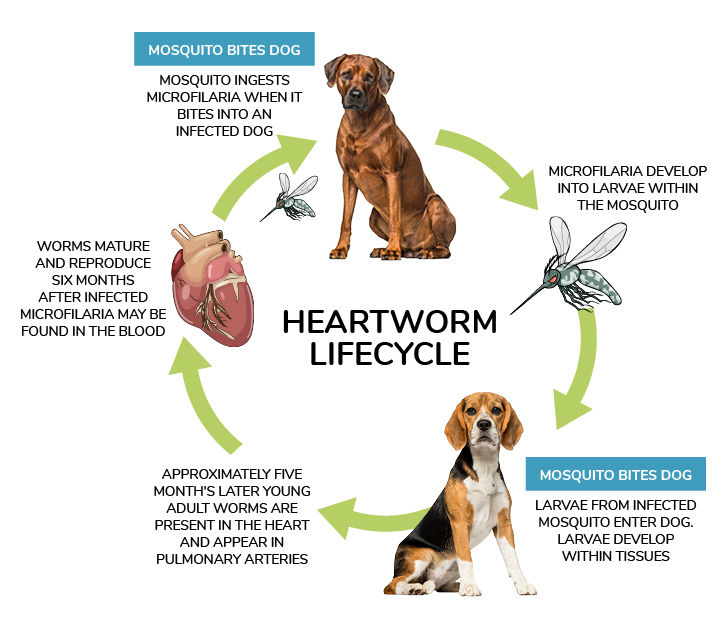There has been an alarming number of positive heart worm cases within the Central Highlands Region over the past few months. With numbers increasing so quickly over a short period of time we need to act fast to ensure that all dogs are protected from this deadly parasite.
Heart worm is a parasitic round worm that infects dogs, being their natural host, which means that once they are infected the juvenile heartworm can complete their entire life cycle within the dog. Juvenile heart worm are spread through more than 60 different types of mosquitos'. When an infected mosquito feeds on a dog, the Microfilaria (juvenile heartworm) enter the dogs blood stream were they begin to mature and make their way through the blood stream into the dog’s heart, lungs and associated blood vessels. Once the worms enter the heart and lungs of the infected dog they can grow to be up to 30 Centimetres long and can be accompanied by hundreds of other Heartworms.
Dogs that are infected may not show any clinical signs of infection until there has been significant damage done to their internal organs. As the damage increases symptoms as listed below can become present:
- Coughing
- Becoming lethargic
- Lose his/her appetite
- Having difficulties breathing
- Tire rapidly after only moderate exercise
If your dog is infected with Heartworms and is left untreated it can ultimately result in slow and painful death. There is a very simple blood test that can be completed within your Veterinarian clinic that can discover whether or not your dog has been infected with Heartworms.
If your dog tests negative with their first test then we can immediately start heartworm prevention, they will also need another test in 6 months’ time. This is because the antigen heartworm tests are only capable of detecting adult Heartworms within the blood, but it can take 6 months for microfilaria (juvenile Heartworms) to mature and become adults.
We recommend that all dogs in the area that have not been on regular heartworm prevention be tested for heartworm immediately. For prevention and treatment of heartworm please contact your veterinarian for the best option for your dog. If your dog has not been on regular prevention or you are unsure, it is best to have your dog tested before starting or recommencing any heartworm prevention as they can become ill if an inappropriate prevention is given.
There are two options for heartworm prevention within dogs. There is a once yearly injection that is highly recommended and effective. There is also the option of giving your dog a tablet prevention, which is required to be given diligently every 4 weeks, otherwise your dog can have a lapse in prevention and become vulnerable to infection again.
If your dog has tested positive for Heartworms there are a few additional tests that your Veterinarian will complete to confirm the diagnosis and your dog’s overall condition, including: a microfilaria test (juvenile Heartworms in the blood stream), a complete blood cell count, blood chemistry tests, a urinalysis and chest X-rays which will all aid in the treatment planning stage for your dog.
If your dog is positive for heartworm there is treatment options available, depending on severity of disease. In some instances the dogs are too severe to allow for treatment and Euthanasia is only option. An overview of the treatment available:
- Medications: Protocols for treating Heartworms often call for the use of multiple medications including several injections (that are given whilst your dog is staying overnight at the clinic) to kill the adult Heartworms, doxycycline and prednisone taken orally to reduce the chances of unwanted side effects, and heartworm preventative to kill the juvenile Heartworms and prevent further infection. In some cases, other medications may be prescribed or different protocols recommended.
Exercise restriction is a vital part of successful treatment for Heartworms in dogs (for all treatment methods). This is required before, during and after treatment for a prolonged period of time. It is known that exercise increases damage to heart, lungs and blood vessels. This will involve periods of strict cage rest, no running freely and no walks or vigorous playing etc., depending where you are at with the treatment plan.
Unfortunately there are risks involved with the treatment of Heartworms within your dog. When heart worms die (from treatment or at the end of their life cycle) pieces of the decomposing worm can create blockages in the vessels in the lungs and other major organs which can cause sudden death.
Once your dog has completed treatment, they will require to have another heartworm test to ensure that treatment is successful. Once the all clear has been given we can commence heartworm prevention for your dog to ensure they do not become infected again.
